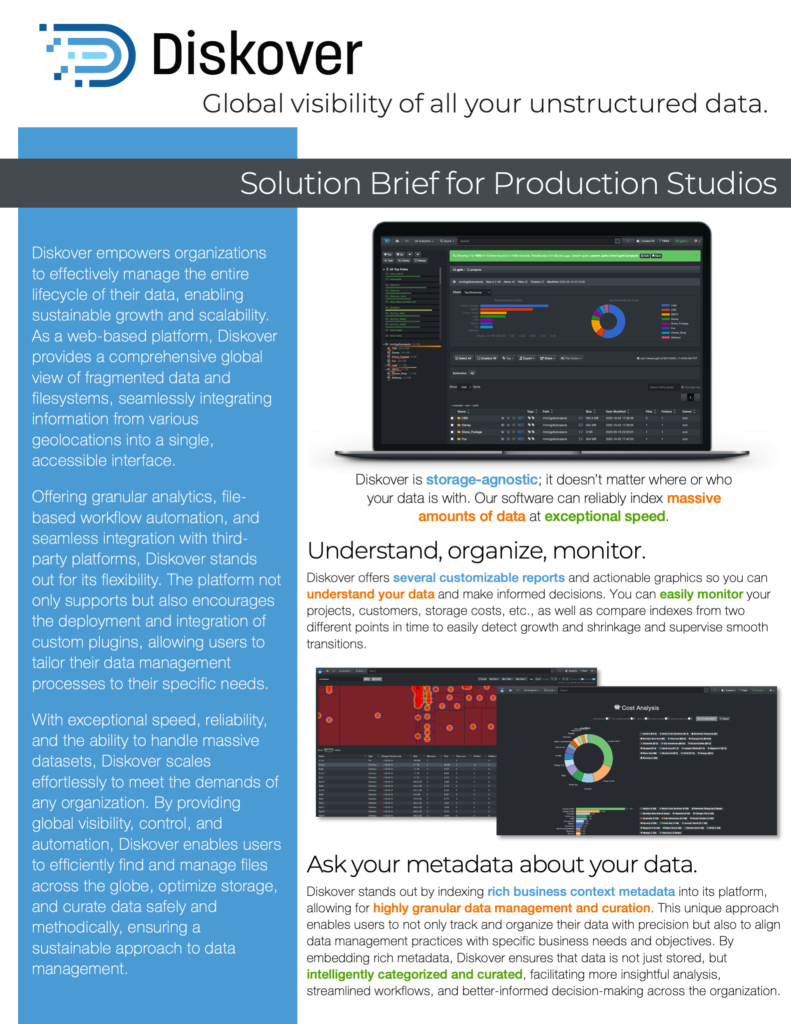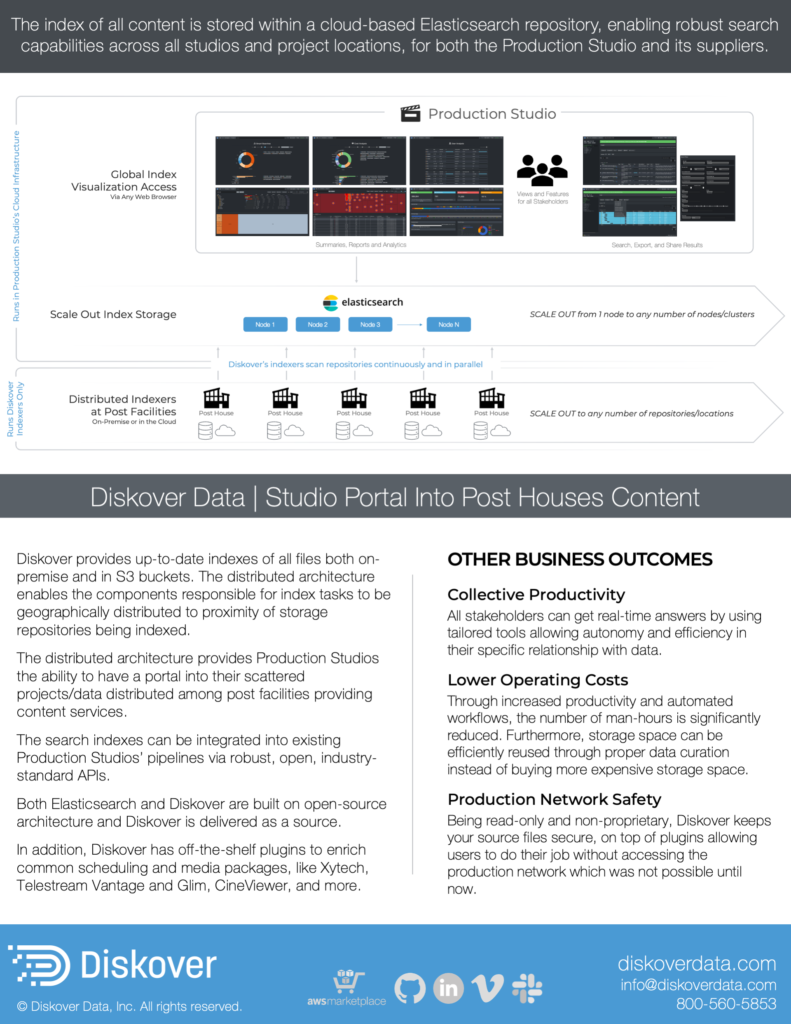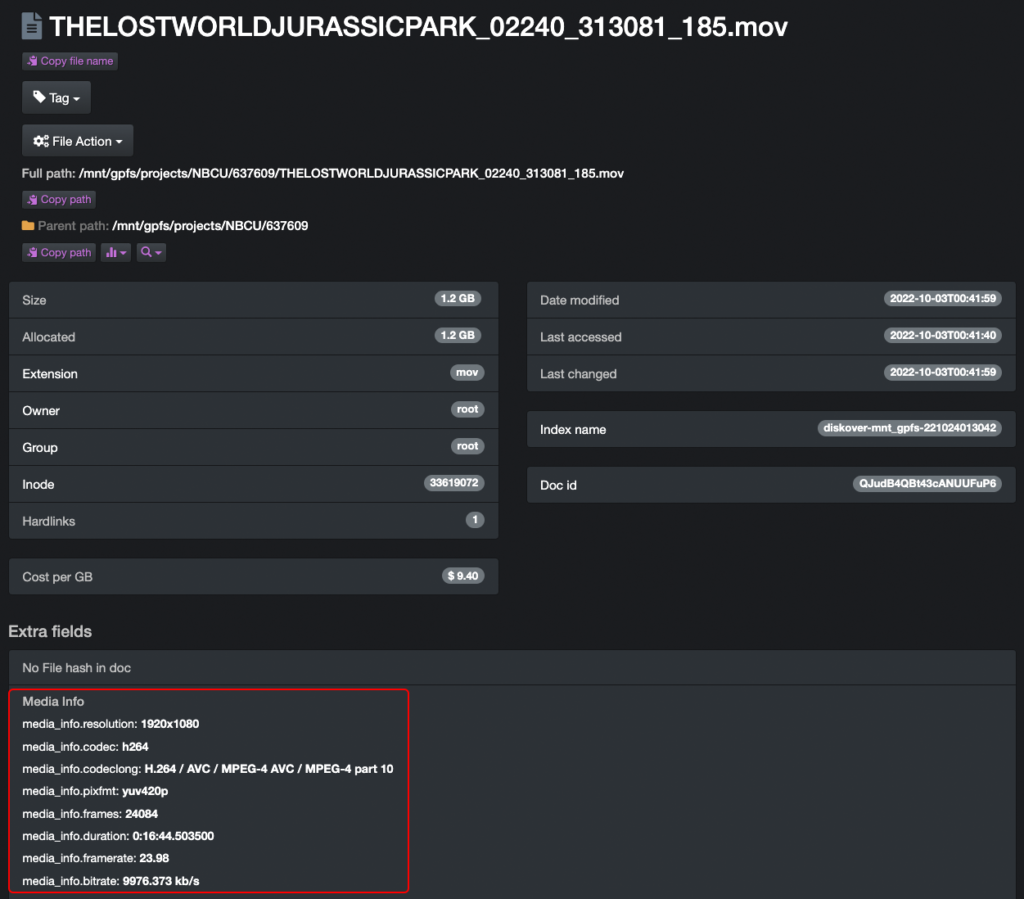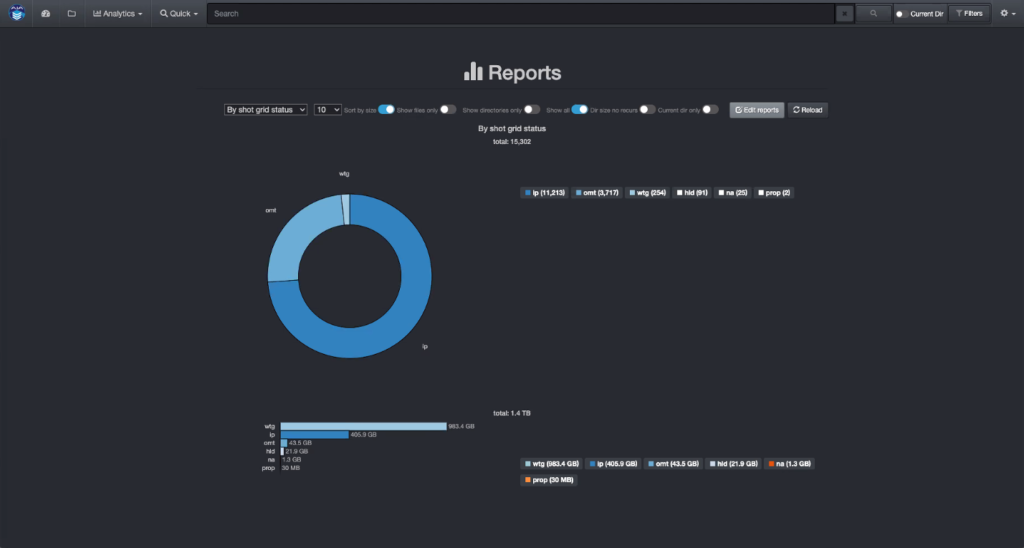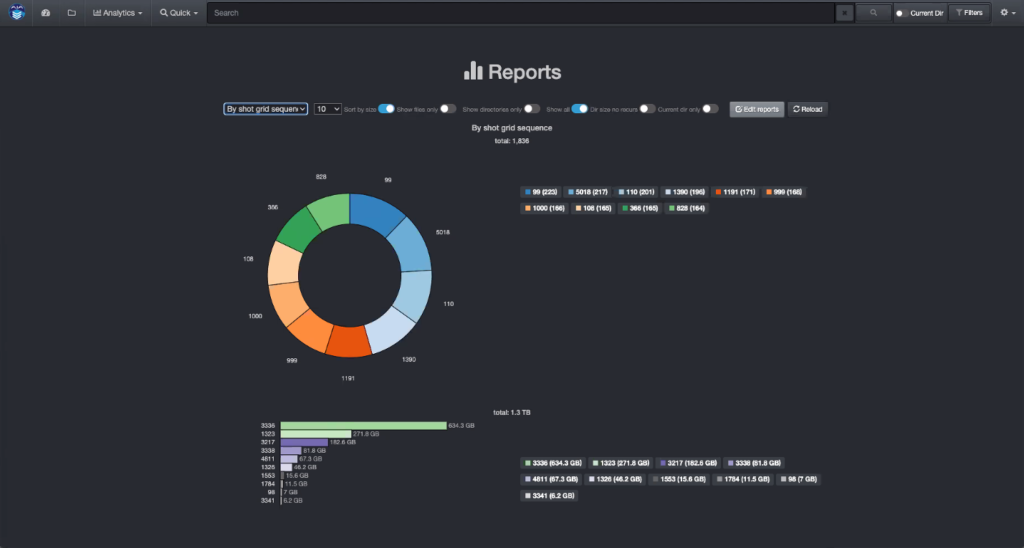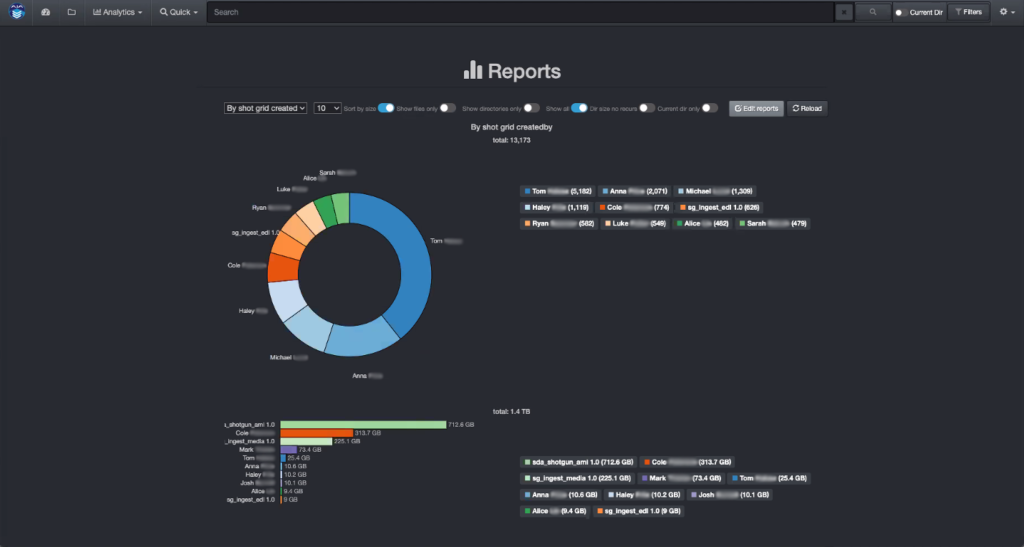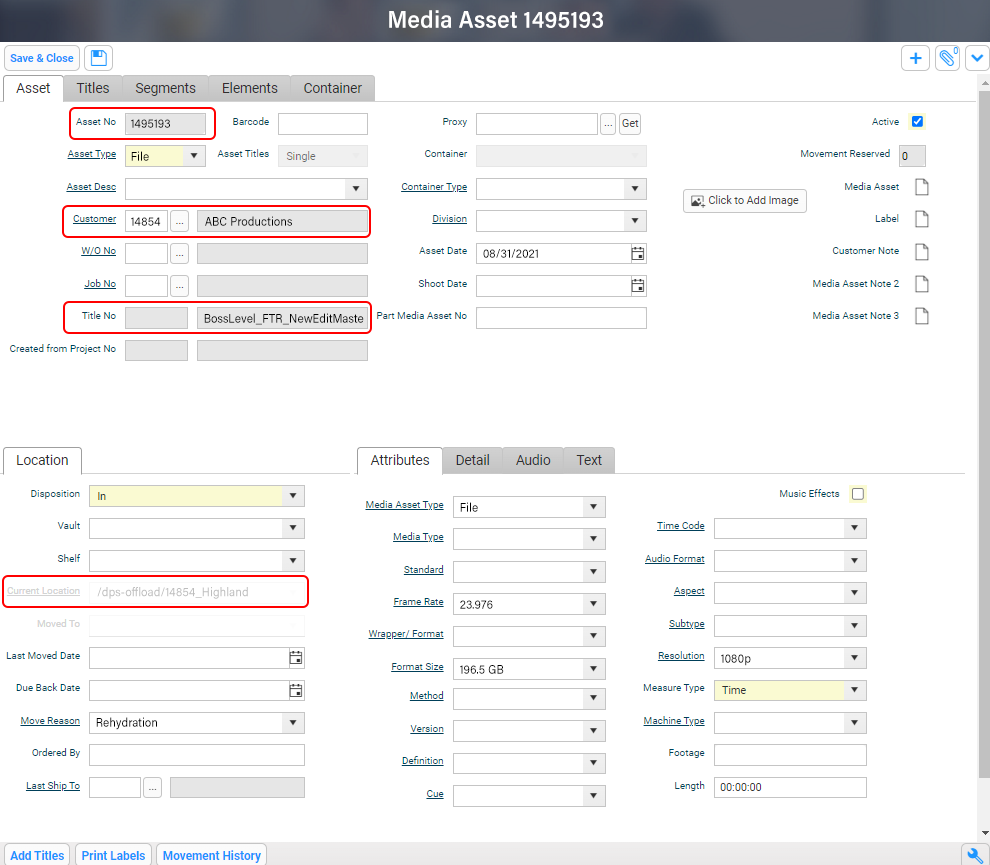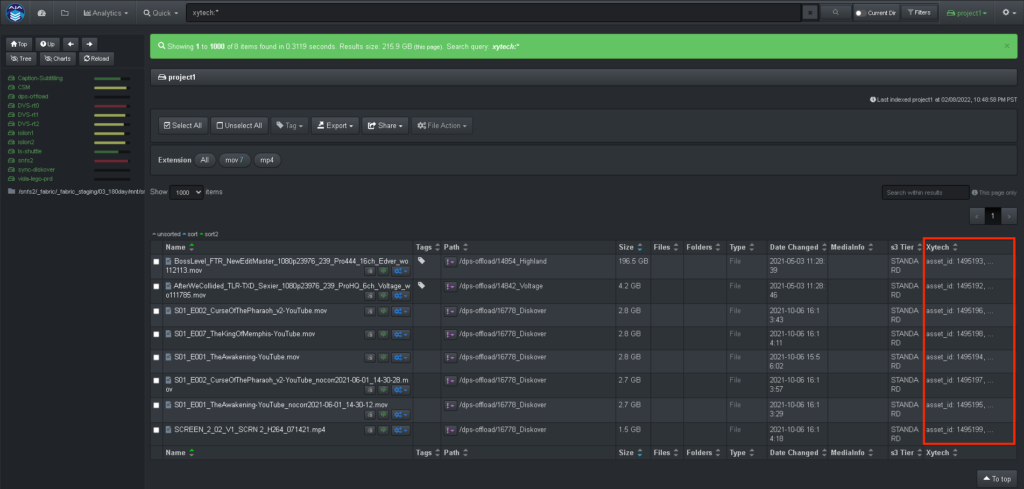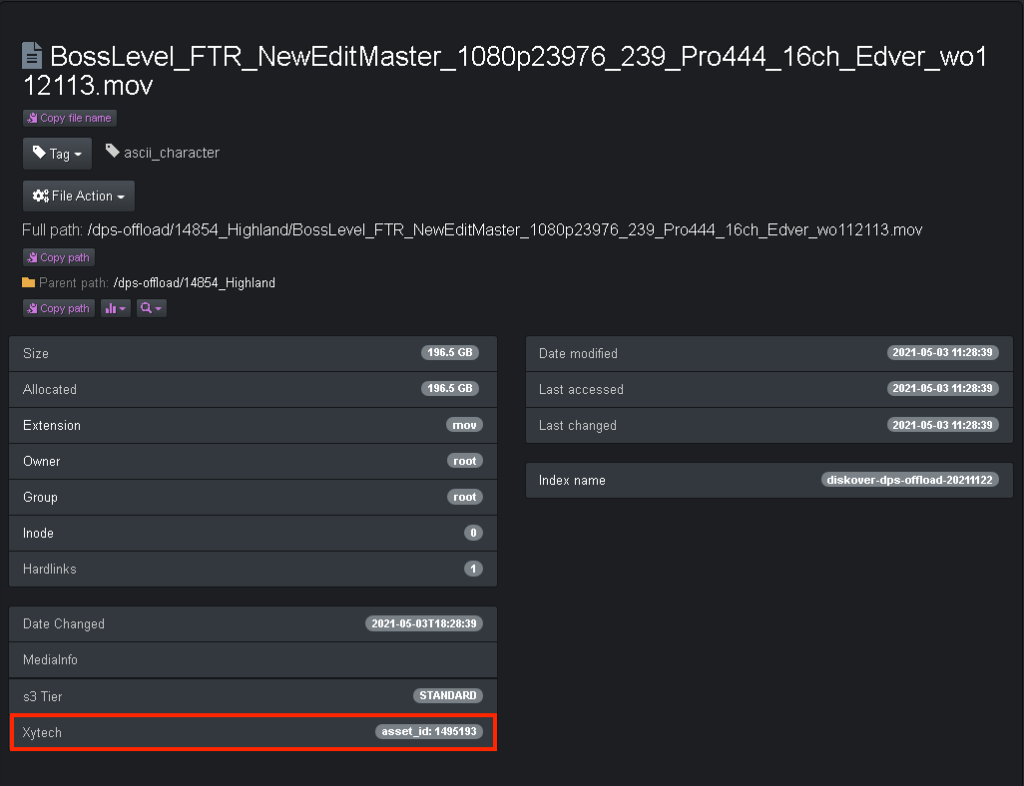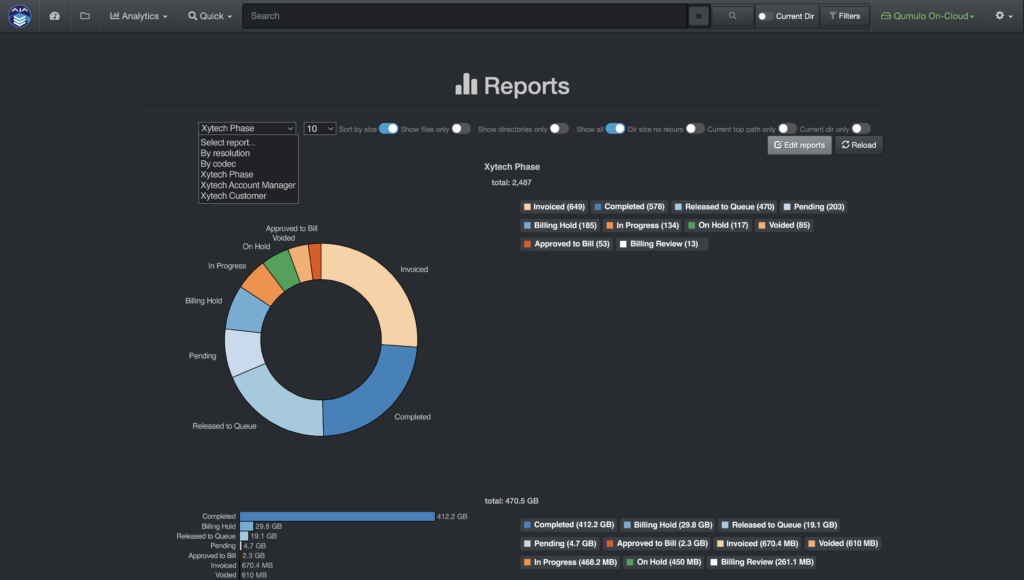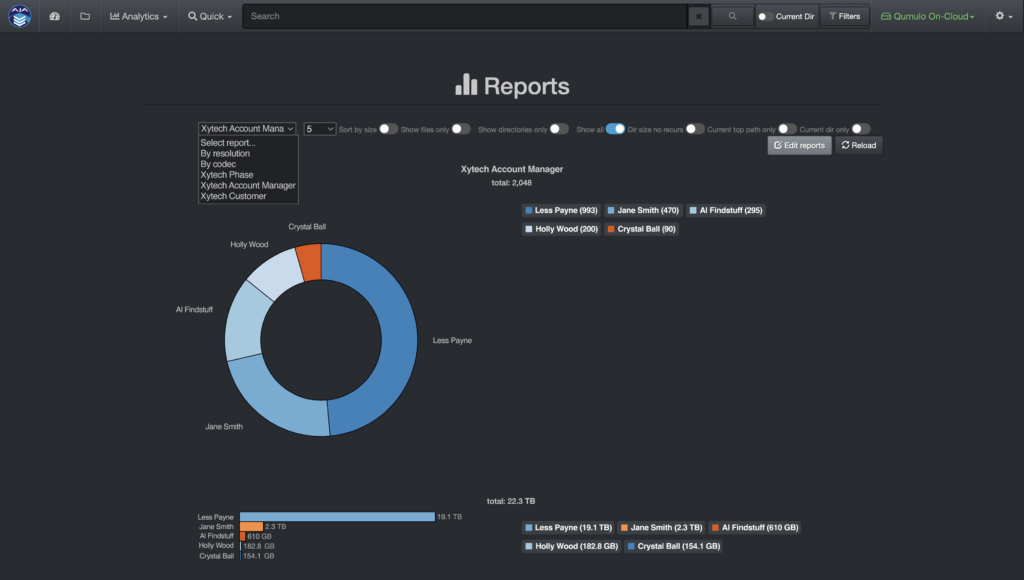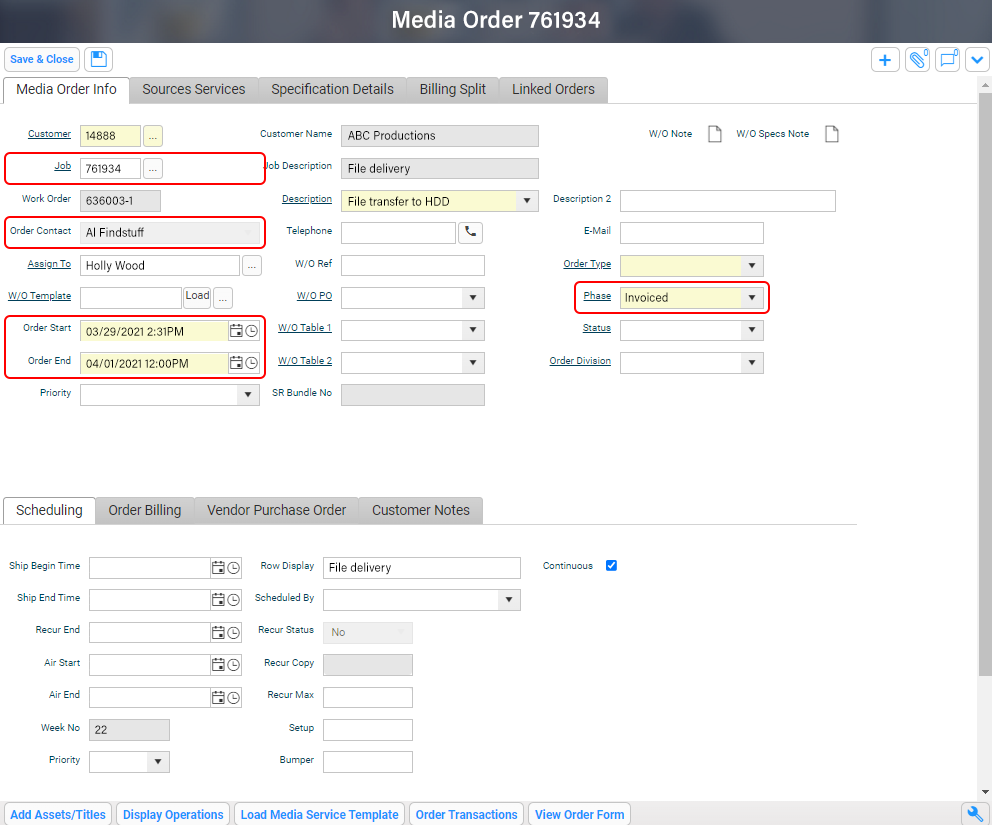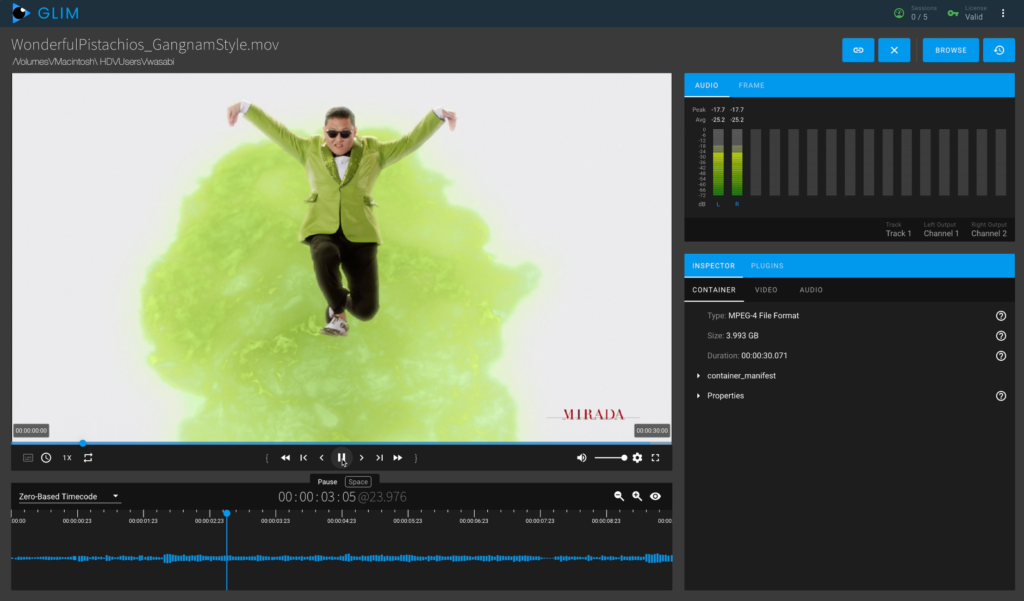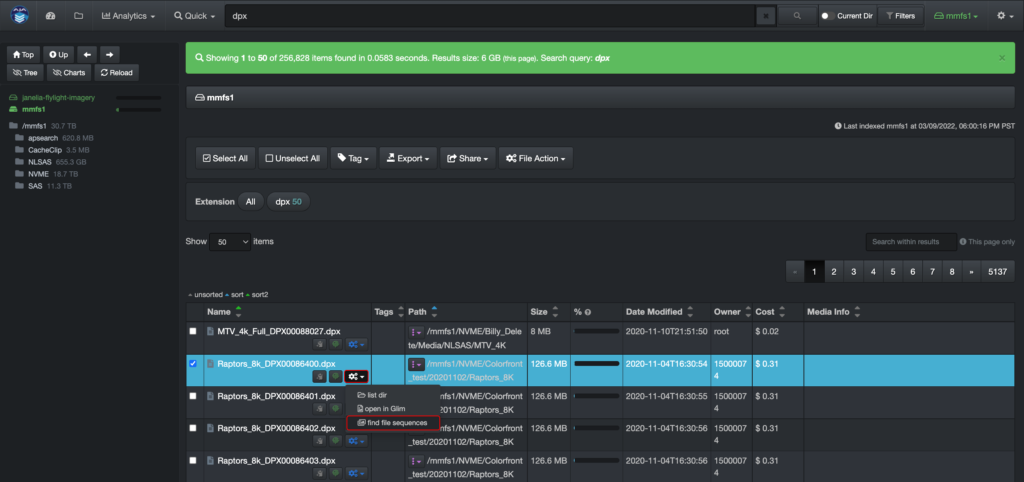SOLUTIONS for MEGS | MEDIA, ENTERTAINMENT, GAMES & SPORTS
Where creativity meets efficiency.
Diskover offers a rich ecosystem of solutions tailored for MEGS workflows, helping some of the world’s largest media corporations cut costs and maximize efficiency across teams and infrastructure.
Business-context metadata for supercharged control and performance.
Workflow automation tools for optimized efficiency.
USING DISKOVER TO OPERATIONALIZE M&E data pipelines
USE CASE
Global leader handling content management and distribution for major studios.
CHALLENGE
MANAGE
AUTOMATE
BENEFITS
MEDIA INFO PLUGIN | ADDS BUSINESS-CONTEXT TO YOUR METADATA CATALOG
Media Info.
Search, analyze, and automate using your media assets’ awesome secrets.
Pushing the boundaries of searchability and accuracy, the Media Info plugin enriches the index with additional metadata, such as media-specific attributes (e.g., file resolution, codec, pixel format, etc.). These attributes are seamlessly integrated, making them searchable, reportable, and actionable.
If a source file lacks media attributes, those fields simply won’t be harvested or available for use within Diskover.
Media attributes summary.

CINEVIEWER PLAYER PLUGIN | SECURE MEDIA VIEWER
CineViewer Player.
Protect your assets: give visibility without granting access.
The CineViewer Player is designed to securely view high-resolution media from a remote browser without giving users access to the source files.
Through the Diskover user interface, CineViewer allows for seamless validation of media assets, therefore increasing productivity, while safeguarding your production network.
The CineViewer Player is developed by CineSys LLC, a major technological and channel partner of Diskover Data.
Single click launch in the Diskover interface.
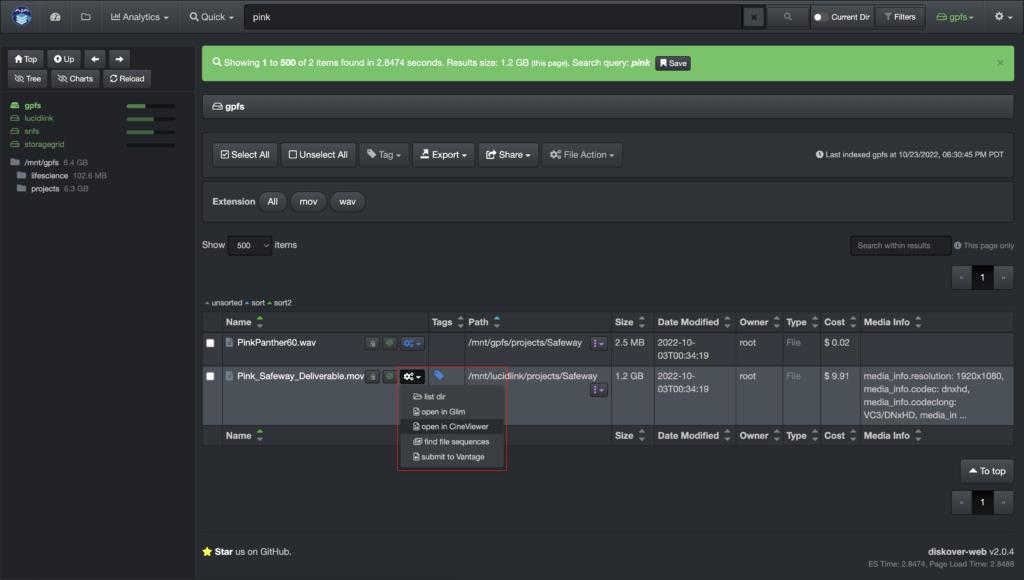
SHOTGRID PLUGIN | ADDS BUSINESS-CONTEXT TO YOUR METADATA CATALOG
ShotGrid/Flow Production Tracking.
A wealth of production status metadata.
The Flow Production Tracking (formerly ShotGrid) Plugin is designed to enhance basic metadata with detailed production status information, aligning data management with production schedules. The Diskover Flow Production Tracking Plugin can harvest over a hundred attributes from the Autodesk Flow Production Tracking platform for every shot directory located on storage. These attributes become properties of the shot directories and include status information such as finaled, out-of-picture, multiple project tracking dates, and many more, totaling around one hundred indexable fields.
These searchable business context attributes enable very precise data management decision-making via granular reporting, and can easily be engaged in workflows and File Actions. A representative workflow might be to archive all shots directories 30 days after their status has been updated to finaled.
For each shot directory within Diskover, the Flow Production Tracking attributes basically become a property of that directory. All fields/metadata harvested become searchable, reportable, and actionable within Diskover.
Diskover user interface still uses ShotGrid.
Autodesk changed its product name from ShotGrid to Flow Production Tracking in 2023. Although our literature now refers to Flow Production Tracking, ShotGrid is still used in Diskover’s user interface and backend post-index harvesting until further notice.
Attributes in the Diskover user interface.
The Autodesk Flow Production Tracking platform offers over one hundred indexable fields. Users can opt to index all or just the ones relevant to their use cases.
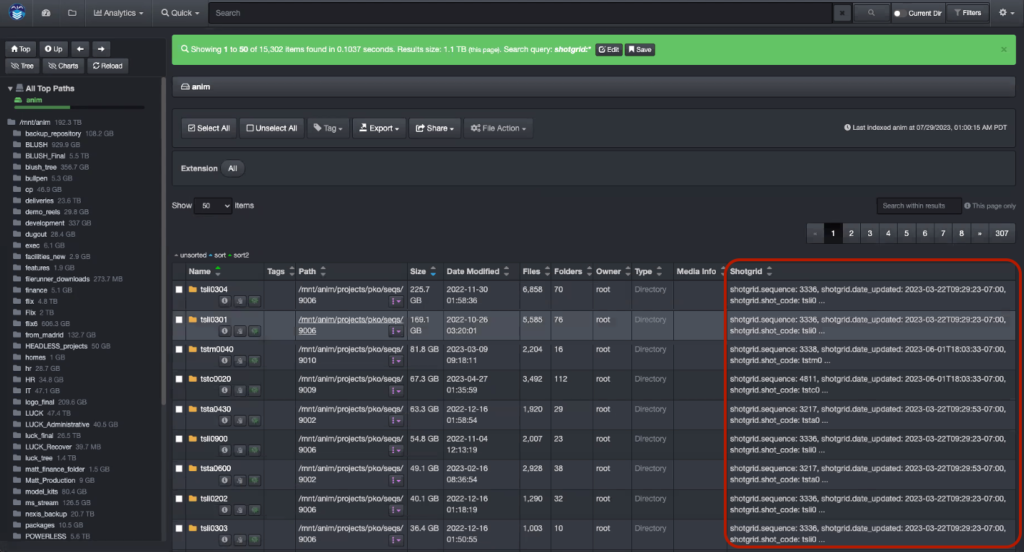
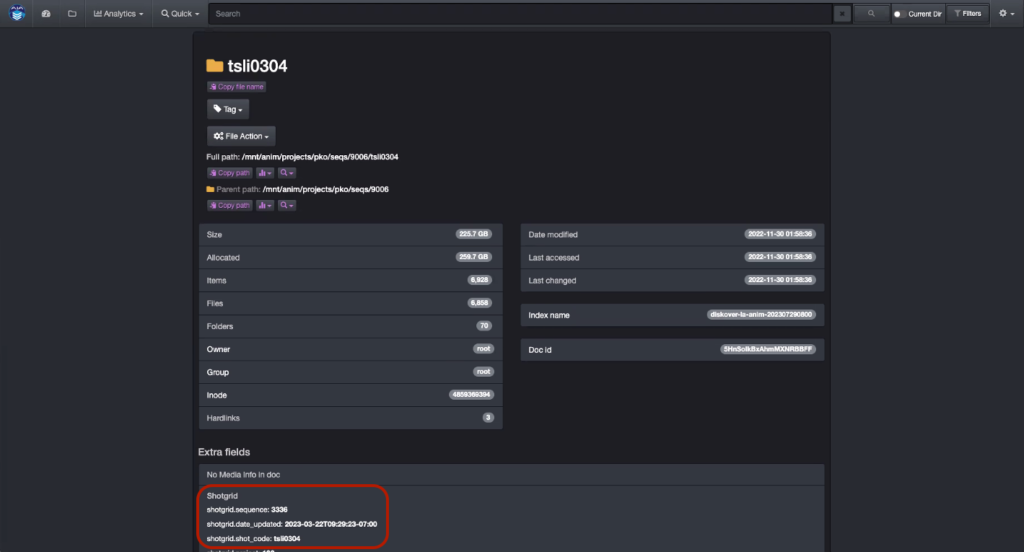
Sample of analytics using Autodesk Flow Production Tracking media-centric attributes.
Below are some examples of Diskover’s customizable analytics, leveraging order status attributes harvested from the Autodesk Flow Production Tracking platform. These attributes add valuable business context to standard data. Users can craft tailored queries and define the number of top results to display in a clear and comprehensive overview.
In line with an organization’s guidelines, decisions can be streamlined to free up substantial storage space—whether by migrating finaled data to a cost-effective asset preservation platform or deleting it after client delivery. This entire process can be effortlessly automated using Diskover’s integrated workflows.
XYTECH ASSET CREATION PLUGIN | ADDS BUSINESS-CONTEXT TO YOUR METADATA CATALOG
Xytech Asset Creation.
Gain visibility and searchability of all your archived media, on tape or removable hard drives.
Post facilities often have customers’ assets that have been archived and lack findability, visibility, and searchability, and therefore, the opaque nature of these assets makes them difficult to reuse or repurpose. Companies with years of such archived assets have often stored these on tape media or removable hard drives, which are frequently stored in a physical vault.
Assets were often stored on such “offline” media due to costs; however, with the advent of cloud and object storage, the economics are now making it viable to store such vaulted assets on more “online media.” Simply putting these assets onto online media does not necessarily make these assets findable in context or within the facility’s order management system.
The Xytech asset creation tool is designed to find and index newly restored online assets from LTO tapes, removable hard drives, etc., making them available, findable, and searchable within the Xytech Media Operations Platform as well as within Diskover.
The plugin assumes that assets restored to online media are placed into a folder using a specific naming convention. The information is added to the asset within Xytech, and the asset number is assigned as a field to the file within the Diskover Index.
XYTECH ORDER STATUS PLUGIN | ADDS BUSINESS-CONTEXT TO YOUR METADATA CATALOG
Xytech Order Status.
Production status insights for accurate assets correlation.
The Xytech Media Operations Platform order status plugin automates the correlation between the order management and storage systems by harvesting key business context from Xytech and enriching Diskover’s metadata catalog. In turn, this business context metadata can be used to automate workflows, curate data, monitor costs, create highly customized reports, and search granularly.
Facilities often manually correlate the order management system with the storage repositories. However, manual processes are subject to human errors and difficult to scale as the volume of media orders and data turnover increases constantly.
Therefore, the lack of integration for file-based workflows between the order management system and the underlying storage repositories makes data management decisions difficult as they are solely based on attributes of files or objects on storage. Additional business context is needed from the order management system to increase the precision and accuracy of data management decisions.
An instance of key information might be the invoice date for a work order. A status change for a work order can be a key indicator for data management; for example, once a Xytech media order has been “invoiced”, then the data associated with that media order can be a candidate for archival.
Sample of analytics using Xytech Order Status media-centric attributes.
Below are some examples of Diskover’s customizable analytics, leveraging order status attributes harvested from the Autodesk Flow Production Tracking platform. These attributes add valuable business context to standard data. Users can craft tailored queries and define the number of top results to display in a clear and comprehensive overview.
In line with an organization’s guidelines, decisions can be streamlined to free up substantial storage space—whether by migrating finaled data to a cost-effective asset preservation platform or deleting it after client delivery. This entire process can be effortlessly automated using Diskover’s integrated workflows.

Media order in Xytech.
Example of order status attributes harvested from Xytech during Diskover indexing. Each field can be individually searched for granular results.
xytech.phase: Invoiced
xytech.account_manager: Al Findstuff
xytech.begin_date: 2022-07-19T17:00:00-07:00
xytech.due_date: 2022-07-19T21:00:00-07:00
xytech.invoice_id: 761934
xytech.invoice_date: 2022-07-21T10:08:00-07:00
TELESTREAM GLIM PLUGIN | SECURE MEDIA VIEWER
Telestream GLIM.
Visibility without access.
This plugin results in a seamless integration with GLIM, allowing end-users to safely view and validate media files while safeguarding your source assets and production network. Diskover allows users to do advanced searches of media assets, and then launch GLIM in one click via our File Actions.
You need to have a GLIM account and be logged in previously to launch the GLIM plugin within Diskover.
TELESTREAM VANTAGE PLUGIN | MEDIA WORKFLOW OPTIMIZATION
Telestream Vantage.
Find. Submit. Done.
The Diskover Telestream Vantage Plugin allows end-users to submit files for transcoding directly from the Diskover user interface. The major benefits:
- The plugin eliminates many steps from going back and forth between the two softwares.
- Vantage offers several transcoding options which can be confusing to non-technical users > the plugin allows for limiting the number of options to only the ones relevant to the end-users.
- Creating a Vantage account for an end-user is intensive as it requires complex and time consuming configurations > end-users access Vantage from Diskover and then only need to access Job Status.
- End-users with a Vantage account also means that they have access to your production network > the plugin keeps your network secure as the end-users only have access to read-only information via Diskover.
- Files are very easy to find within Diskover’s global index compared to Vantage where one needs to know where to look.
- The learning curve is quick and easy for new end-users.
USE CASE
Vantage and GLIM workflow integration at Visual Data for localization services.
The objective of this workflow is to enable the Media Services personnel to create deliverable transcoded files while reducing complexity, security exposures, and human errors.
Source content often resides in production storage, which is air-gapped from both internet access and internal IT networks. Ideally, these file-based workflows operate factory-like, with files constantly moving down the production line. Integrating Diskover and Telestream enables Media Services personnel to generate low-resolution proxies without the need to provide these individuals direct access to production content.
Diskover’s global index provides high-speed search to media production content without read/write access privileges in order to find the desired source material, generally mov or mxf files. Once the desired files are located, the end-user can launch Telestream GLIM directly from the Diskover interface to preview/validate the asset, avoiding the need to switch applications and copy/paste file paths.
Once the assets are located and validated, the end-user can launch Vantage directly from the Diskover interface to create proxies to be used by localization services. All low-resolution mp4 files are generated and sent to known locations upon job submission to Vantage. The original source files are then moved to the S3 location. Since low-resolution proxies are 100% recreatable, the generated proxies can be “autocleaned” via Diskover after an established time. Should the Media Services individual need to regenerate the low-resolution proxy at some future point, the material can easily be relocated to the S3 location via Diskover, and the above workflow is repeated.
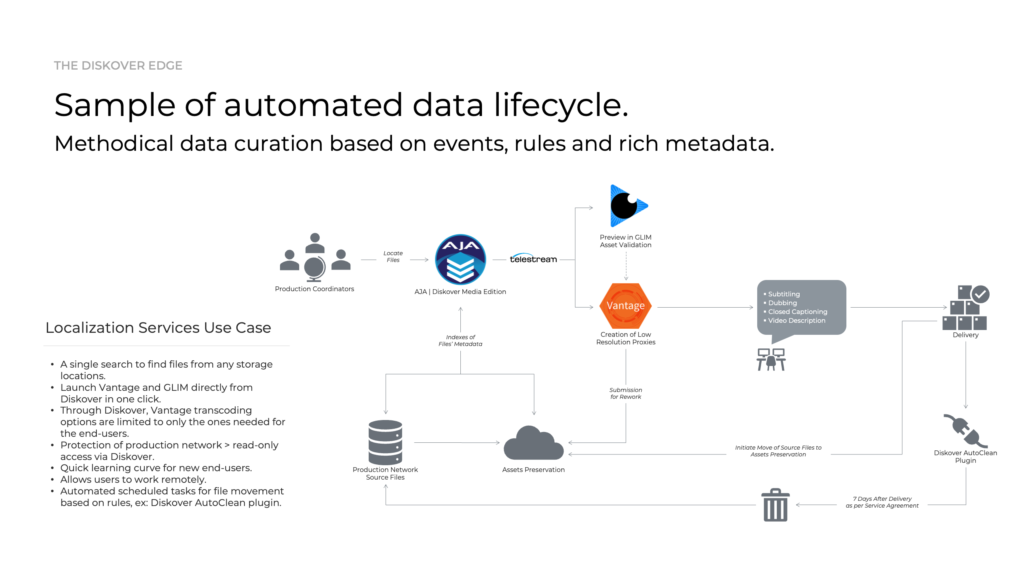
Diskover has the ability to work with other applications if they have an SDK available. In the case of Telestream’s Vantage transcoding workflow platform, we have found that a combination of Diskover search tools and Vantage makes a really good team.
To eliminate the need to give users access to production content, and the ability to search through thousands of files, the Diskover team built a Vantage submit tool that directly allows to search a file, select that specific file or multiple files, and submit them to the Vantage workflow of your choice.
It’s extremely versatile and communicates very quickly. This procedure is only in its first phase so expanding it to allow workflow status submission, and more advanced workflows like audio overlay and subtitle overlays is on the road map.
Randall Derchan // IT Manager

IMF PACKAGE VALIDATOR PLUGIN | MEDIA WORKFLOW OPTIMIZATION
IMF Package Validator.
by

Validation prior to delivery, no matter the location of the user…and the IMF package data.
The Oxagile IMF Package Validator plugin allows content creators, distributors, and broadcasters to validate IMF packages before delivery from a remote platform, regardless of the location of the user and the IMF package data. The main benefits are:
IMF stands for Interoperable Master Format, which is a technical standard used in the Media and Entertainment industry for the exchange of digital content between different platforms and systems. The IMF format is used to deliver high-quality video content to a variety of devices, including TVs, mobile devices, and web browsers.
Netflix requires all its content to be delivered in IMF format, which undergoes rigorous validation to ensure compliance with industry standards. The validation process involves extensive testing of the content’s video, audio, and metadata to ensure that it meets the production studios’ technical specifications and can be delivered to viewers in the highest quality possible.
Once the content has been validated, it is then encoded into various formats, including 4K and HDR, and made available for streaming on various platforms. The IMF validation process is a critical step in the content delivery pipeline, ensuring that viewers receive high-quality content that meets industry standards and can be enjoyed on a variety of devices.
The IMF Package Validator Plugin is developed by Oxagile, a major technological partner working with Diskover Data.
“We are excited to provide this much-needed service to media customers, as it will help quickly cue more content creators and providers into when their content is ready to share with their distribution partner or client by meeting IMF packaging requirements. We’re confident this will save them both time and money compared to the processes currently required to validate content.”
Matt Pinckley // US Director of Business Development

Launch validation via File Action.
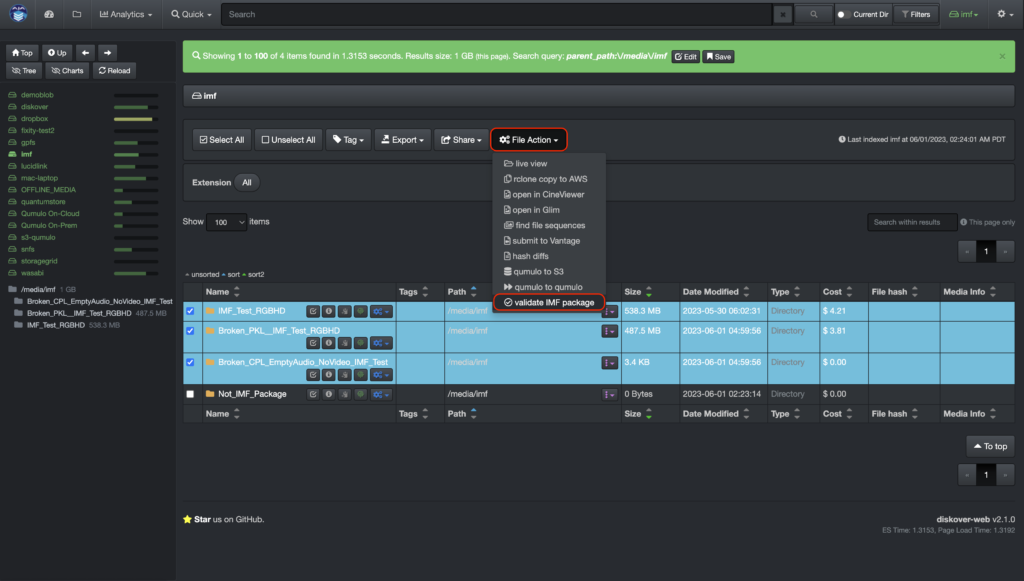
Successful validation report.
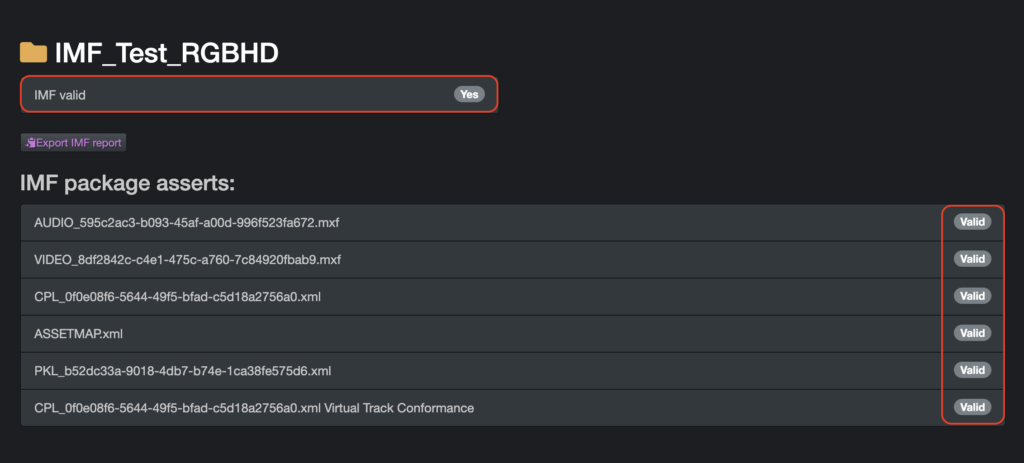
Detailed validation status per package.
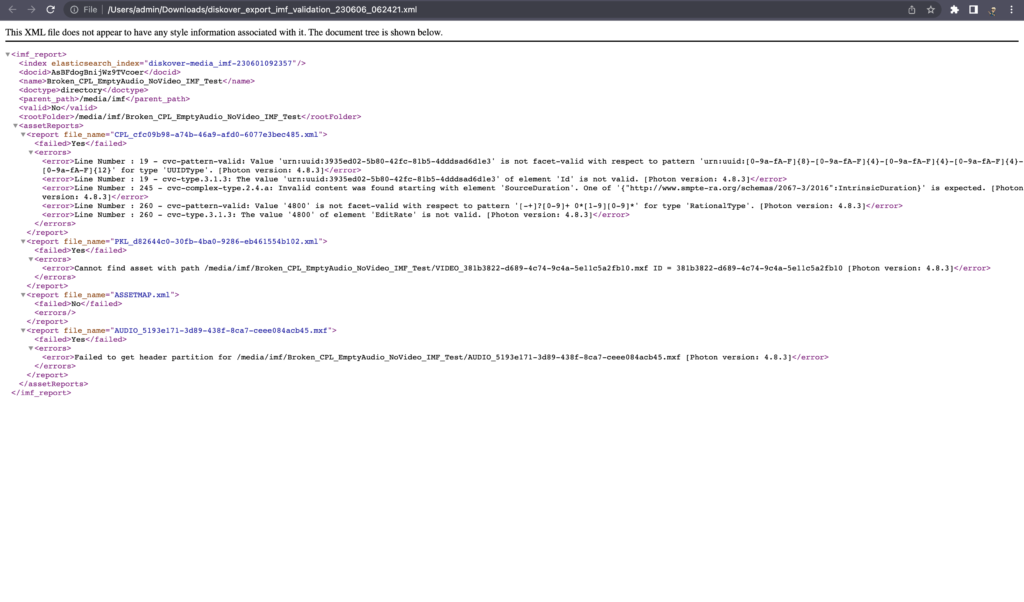
Validation status via tags.

Failed validation report.
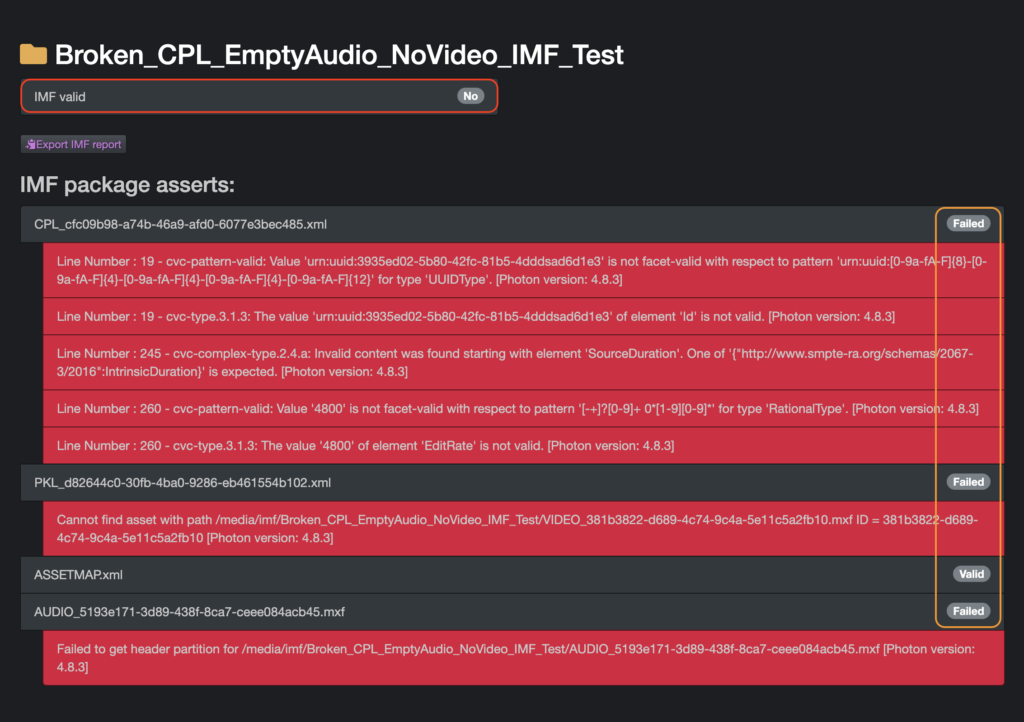
Please Note
The current version limits verification capabilities to the latest version of the Netflix Photon tool. Cloud storage, archives, and DCP packages are currently not supported.
FIND FILE SEQUENCES PLUGIN | MEDIA WORKFLOW OPTIMIZATION
Find File Sequences.
EDL CHECK & DOWNLOAD PLUGINS | MEDIA WORKFLOW OPTIMIZATION
EDL Check & Download.
Stay tuned for more details—these are brand-new tools!
EDL Check File Action.
Allows authorized users without read/write access to production storage to verify the validity of EDL (Edit Decision List) files.
EDL Upload/Download File Action.
Allows authorized users without read/write access to production storage to upload or download specific lists of pre-defined file types and sizes, eliminating the need for data management group involvement.
IMF CHANGE REPORT PLUGIN | MEDIA WORKFLOW OPTIMIZATION
IMF Change Report.
Stay tuned for more details—this is a brand-new tool!
Generates a list of IMF image changes in both human-readable format and machine-readable EDL, referencing the updated media.




